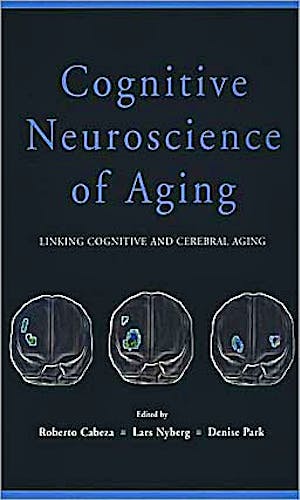

No hay productos en el carrito



Cognitive Neuroscience of Aging. Linking Cognitive and Cerebral Aging
Cabeza, R. — Nyberg, L. — Park, D.
1ª Edición Enero 2010
Inglés
Tapa blanda
408 pags
1000 gr
16 x 24 x 2 cm
ISBN 9780195388220
Editorial OXFORD USA
LIBRO IMPRESO
-5%
59,04 €56,09 €IVA incluido
56,77 €53,93 €IVA no incluido
Recíbelo en un plazo de
2 - 3 semanas
About this book
Until very recently, our knowledge about the neural basis of cognitive aging was based on two disciplines that had very little contact with each other. Whereas the neuroscience of aging investigated the effects of aging on the brain independently of age-related changes in cognition, the cognitive psychology of aging investigated the effects of aging on cognition independently of age-related changes in the brain. The lack of communication between these two disciplines is currently being addressed by an increasing number of studies that focus on the relationships between cognitive aging and cerebral aging. This rapidly growing body of research has come to constitute a new discipline, which may be called cognitive neuroscience of aging. The goal of Cognitive Neuroscience of Aging is to introduce the reader to this new discipline at a level that is useful to both professionals and students in the domains of cognitive neuroscience, cognitive psychology, neuroscience, neuropsychology, neurology, and other, related areas.
This book is divided into four main sections. The first section describes noninvasive
measures of cerebral aging, including structural (e.g., volumetric MRI), chemical
(e.g., dopamine PET), electrophysiological (e.g., ERPs), and hemodynamic (e.g.,
fMRI), and discusses how they can be linked to behavioral measures of cognitive
aging. The second section reviews evidence for the effects of aging on neural
activity during different cognitive functions, including perception and attention,
imagery, working memory, long-term memory, and prospective memory. The third
section focuses on clinical and applied topics, such as the distinction between
healthy aging and Alzheimers disease and the use of cognitive training to ameliorate
age-related cognitive decline. The last section describes theories that relate
cognitive and cerebral aging, including models accounting for functional neuroimaging
evidence and models supported by computer simulations. Taken together, the chapters
in this volume provide the first unified and comprehensive overview of the new
discipline of cognitive neuroscience of aging.
Table of Contents
1: Cognitive Neuroscience of Aging: Emergence of a New Discipline (Roberto
Cabeza, Lars Nyberg, and Denise C. Park)
I. Imaging Measures
2: The Aging Brain Observed in Vivo: Differential Changes and Their Modifiers
(Naftali Raz)
3: The Role of Dopamine Systems in Cognitive Aging (Lars Backman and Lars Farde)
4: Electrophysiological and Optical Measures of Cognitive Aging (Monica Fabiani
and Gabriele Gratton)
5: BOLD Functions MRI and Cognitive Aging (Adam H. Gazzaley and Mark D'Esposito)
6: The Relationship Between Brain Activity, Cognitive Performance, and Aging:
The Case of Memory (Michael D. Rugg and Alexa M. Morcom)
II. Basic Cognitive Processes
7: Age-Related Changes in Neural Activity During Visual Perception and Attention
(David J. Madden, Wythe L. Whiting, and Scott A. Huettel)
8: The Cognitive Neuroscience of Working Memory and Aging (Patricia A. Reuter-Lorenz
and Ching-Yune C. Sylvester)
9: Long Term Memory and Aging: A Cognitive Neuroscience Perspective (Denise
C. Park and Angela H. Gutchess)
10: The Neural Basis of age-Related Declines in Prospective Memory (Robert West)
III. Clinical and Applied Issues
11: Three Principals for Cognitive Aging Research: Multiple Causes and Sequelae,
Variance in Expression and Response, and the need for Integrative Theory (Randy
L. Buckner)
12: Functional Connectivity During Memory Tasks in Healthy Aging and Dementia
(Cheryl L. Grady)
13: Cognitive Training in Healthy Aging: A Cognitive Neuroscience Perspective
(Lars Nyberg)
IV. Models in Cognitive Neuroscience of Aging
14: Age Related Changes in Hemispheric Organization (Sander Daselaar and Roberto
Cabeza)
15: Neurocomputational Perspectives Linking Neuromodulation, Processing Noise,
Representational Distinctiveness, and Cognitive Aging (Shu-Chen Li)
Author Information
Edited by Roberto Cabeza, Professor in Psychological and Neuroscience, Duke
University, Edited by Lars Nyberg, Professor of Neuropsychology, Umeå
University, and Edited by Denise Park, Professor of Psychology, University of
Illinois at Urbana-Champaign
Reviews
"The goal of this book as described by the editors was to serve as a comprehensive introduction of the reader to a new discipline, and they have wildly succeeded in this endeavor. Both newcomers to the field and seasoned researchers will enjoy having this book on their shelf for frequent reference." - Cambridge Journals: International Neuropsychological Society
© 2025 Axón Librería S.L.
2.149.0